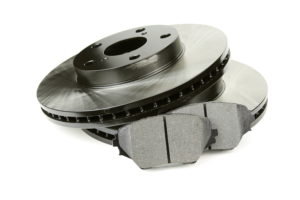
The brake system is often overlooked and taken for granted until you have a significant problem on your hands. When it comes to the most important safety mechanism on your vehicle, letting problems go until that system no longer functions properly is a recipe for disaster. Don’t ignore the warning signs of impending brake failure, keep your braking system functioning at its peak performance.
A soft, spongy feel in the brake pedal is a sure sign of a problem in the hydraulic system. Issues such as air in the lines, failing calipers or wheel cylinders or a weak flex line can feel soft when you hit the pedal. Your brake pedal should be firm and the brakes should feel solid and apply gradually. When the pedal is soft and spongy, your braking system is likely to fail soon. It could be as simple as needing more fluid in the master cylinder.
Once you wear through the actual friction material on the pads, you are grinding metal on metal, which is a bad. If you hear noises when you hit the brake pedal, you likely have a mechanical issue with the braking system. Grinding is a metal on metal sound that means the brake pads are worn out and the base pad is grinding on the rotor. Inspecting the brake system should never be overlooked.
If the rotors are worn, the result can manifest as pulling to one side when the brakes are pressed. This is because the brakes are grabbing harder on one side. The same can happen if the one side is not grabbing at all. As you press the brake pedal, all both left and right sides of the brake system apply equally. If there is an issue with one side, then your vehicle will pull to one side as you use the brakes. This could be a simple adjustment, but most likely the brakes are wearing more on one side than the other. A failing wheel cylinder or caliper will result in uneven wear and application of the brakes. Another issue is worn rotors eating up the pads and grabbing or slipping.
Recent Comments